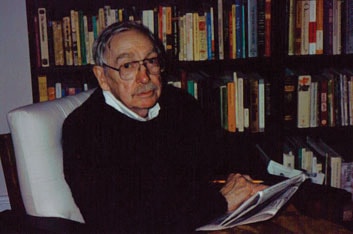
Norbert J. Gossman
Norbert J. Gossman died on Tuesday, June 21 in a hospital near his home in Kensington, Maryland. Norb, as he was known to his friends, was born on a farm near Decorah, Iowa, in 1924 and served in the Army Air Force in the South Pacific during World War II. The GI Bill allowed Gossman to attend the University of Iowa, where he received his BA (1947) and PhD (1952) in history. There he met his future wife Martha, a former WAVE, who was also a GI Bill beneficiary. After receiving his doctorate, Gossman taught as an assistant professor of history at Coe College in Iowa, then at Whitman College in Washington and at the University of Wisconsin, Eau-Claire, before accepting a position at the University of Detroit where he taught for 33 years. Norb was a popular professor and his classes were always full, notwithstanding his reputation as a very tough grader. To the end of his life he was proud of his “Teacher of the Year” awards.
Norb was a scholar of 17th–19th-century British history with a particular interest in the development of radicalism. In addition to many articles and reviews in history journals, he was co-editor with Joseph O. Baylen of the Biographical Dictionary of Modern British Radicals (3 vols. 1979-88) and the author of The Martyrs (1997).
Joe Kelly, who was a teaching fellow and graduate student at the University of Detroit 1961–63 and for whom Gossman was a thesis advisor, says, “During my first seminar, he asked whether I might be interested in writing my thesis on British financing of 19th-century European revolutionaries such as Mazzini, Kossuth, and Bakunin. During the summer of 1962 I went through material at the New York Public Library. When I returned to Detroit that fall he was interested to learn that most of the financing was by wealthy British industrialists who started as political radicals and often died as very conservative politicians. He did considerable independent research and published an article on British financing of Polish, Russian and other revolutionaries, and gave me credit in the article.” Joe was able to return the favor several years later when he introduced Norb to Joe Baylen, then at Georgia State University. Joe Kelly adds, “I am still amazed how I was able to use material from his history courses when I was employed as an expert on gambling law.” To offer testimony in a London criminal court in 2007 on whether poker was prohibited gambling, he used Gossman’s analysis concerning the 18th-century South Sea Bubble to make the case that poker was less of a gamble than stock market speculation. “Norb had the best sense of humor of any of my professors and I still use his Jeremy Bentham stories, which students love,” Joe Kelly adds.
Mike Hayden was a colleague of Gossman from 1961 to 1966. He writes, “I met Norb in the fall of 1961 at the start of my first ‘real’ teaching job as assistant professor at the University of Detroit. We shared an office for five years before I set off on what was planned to be a two or three year adventure in Saskatchewan (where I still live, quite happily). I tried to tempt Norb to join me in the far north, but after his interview in Saskatoon he told me that he had had enough of the prairies in his youth. A highlight of the interview was observing the reaction of an eminent multilingual professor of Renaissance history to the question he asked Norb: Why had he chosen 19th-century British history as his field of study? Because, answered Norb, he didn’t have to learn a second language.” Mike adds, “I still remember with fondness the five years Norb and I shared an office. He was the perfect colleague: friendly, funny, interested, but never nosy, and always ready to listen and to advise a young colleague, husband and father. Though our fields of research were separated by theme, chronology and geography we shared a project during our five years together. To the consternation of some of our colleagues we slowly constructed, expanded and explained to all (who would listen) the definitive account of the history and present state of Fernando Po. The project ended when I left Detroit, but each of us used the result of our work as a very effective lesson in our classes: don’t believe everything you hear—no matter who says it—and don’t dismiss everything you hear, no matter how strange it sounds.”
Norb and Martha retired to Bloomington, Indiana, in 1989 and moved to Maryland in 2010. Norb was a member of Amnesty International, the Indiana Historical Society, the Knights of Columbus, NAMI and St. Charles Borromeo Church in Bloomington, Indiana. For a number of years he was also a volunteer at the Monroe County History Center in Bloomington. Norb is survived by his wife Martha, four children and five grandchildren.
Joseph Kelly
SUNY College at Buffalo
Michael Hayden
University of Saskatchewan (emeritus)